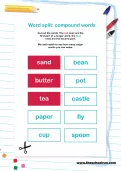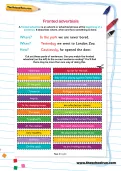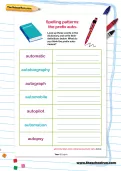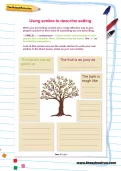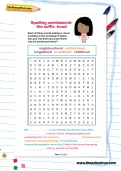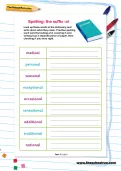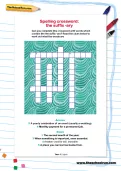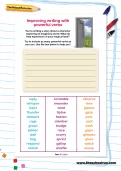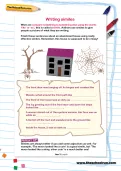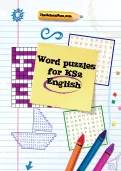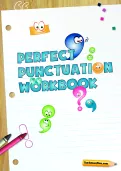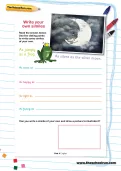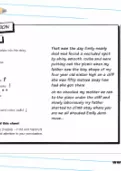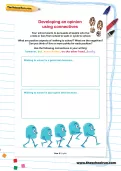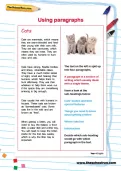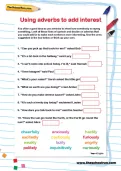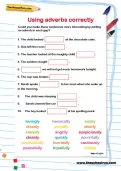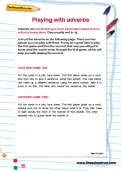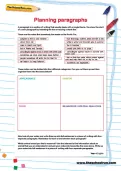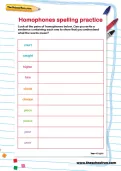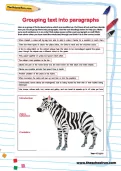Look up these words in the dictionary and write their definitions below. What do you think the prefix auto means?
or
Register to add to your saved resources
When you are writing, similes are a really effective way to give people a picture in their mind of something you are describing. A SIMILE is a comparison – it finds similar characteristics in two objects and compares them. It always uses the words ‘like’ or ‘as’ to make the comparison. Look at this picture and use the simile starters to write your own similes.
or
Register to add to your saved resources
Already a subscriber? to view this content.
Each of these words ending in -hood is hidden in the wordsearch. Can you find them and insert them into the sentences below?
or
Register to add to your saved resources
Already a subscriber? to view this content.
Look up these words in the dictionary and write down what they mean. Practise spelling each word by looking at it, covering it over, writing it on a separate piece of paper, then checking if you were right.
or
Register to add to your saved resources
Already a subscriber? to view this content.
Can you complete this crossword with words which contain the the suffix -ary? Read the clues below to work out what the words are.
or
Register to add to your saved resources
Already a subscriber? to view this content.
Each of these words ending in -ment is hidden in the wordsearch below. Can you find them and insert them into the sentences below?
or
Register to add to your saved resources
Already a subscriber? to view this content.
You’re writing a story about a character exploring an imaginary world. What do they experience in your magical land? Try to include as many powerful verbs as you can. Use the box below to help you!
or
Register to add to your saved resources
Already a subscriber? to view this content.
When we compare something to something else using the words ‘like’ or ‘as’, this is called a simile. Authors use similes to give people a picture of what they are writing. Finish these sentences about an abandoned house using really effective similes. Remember, this house is supposed to be creepy!
or
Register to add to your saved resources
Already a subscriber? to view this content.
Are you and your child tired of the same old English revision and practice sessions? Try something completely new and give them these fun English word puzzles instead! They'll review everything from connectives to apostrophes, using what they learn in class to solve codes, crosswords and wordsearches.
or
Register to add to your saved resources
Already a subscriber? to view this content.
Full stops, commas, semi colons, apostrophes… Whatever aspect of punctuation your child is grappling with, we’ve come up with a bumper pack of 60 activities to help them practise, as well as a parent's refresher guide to each punctuation mark and how it's used.
or
Register to add to your saved resources
Already a subscriber? to view this content.
A worksheet demonstrating to children what a simile is and then giving them prompts to write their own.
or
Register to add to your saved resources
Already a subscriber? to view this content.
A worksheet with a passage of writing that your child needs to read over and mark, inserting the correct punctuation.
or
Register to add to your saved resources
Already a subscriber? to view this content.
This worksheet encourages children to think about the pros and cons of walking to school. It gives a list of connectives and suggests children use these in their writing.
or
Register to add to your saved resources
Already a subscriber? to view this content.
A set of paragraphs with muddled-up sub-headings. Encourage your child to read the paragraphs and then decide which sub-headings go where.
or
Register to add to your saved resources
Already a subscriber? to view this content.
A list of sentences containing speech. Children are encouraged to use the bank of adverbs to improve the sentences.
or
Register to add to your saved resources
Already a subscriber? to view this content.
A list of sentences which could be improved by the use of adverbs. A bank of adverbs is included at the bottom of the sheet to help your child.
or
Register to add to your saved resources
Already a subscriber? to view this content.
Cut up these adverbs and then play the two games suggested. This will help your child to understand the meanings of different adverbs and encourage them to use them when speaking and writing.
or
Register to add to your saved resources
Already a subscriber? to view this content.
Notes on the Arctic Fox for your child to cut up and then organise into different subject boxes. They then need to use these notes to write up their own paragraphs, understanding the need for keeping to a single theme for each.
or
Register to add to your saved resources
Already a subscriber? to view this content.
Pairs of homophones and then blank boxes for your child to write their own sentences containing each homophone, demonstrating that they understand the meaning of each.
or
Register to add to your saved resources
Already a subscriber? to view this content.
Various sentences about zebras for children to cut out and then sort into paragraphs. This activity should help your child to understand how each paragraph in a text needs to be about a single theme.
or
Register to add to your saved resources
